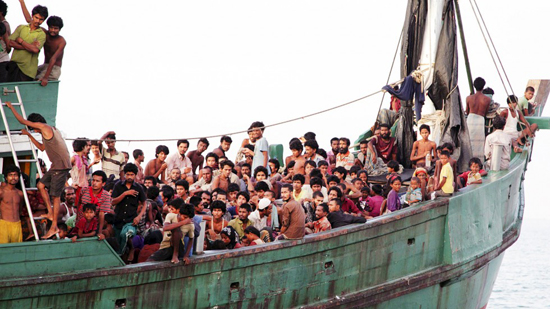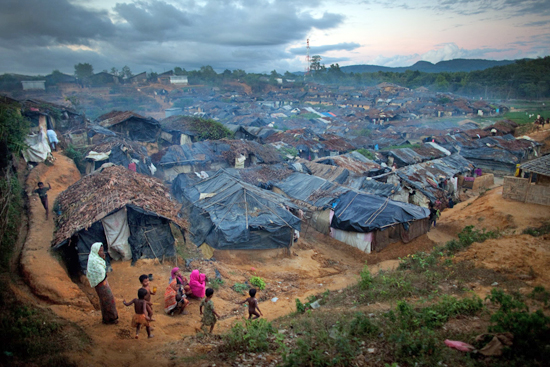The refugee policies of successive governments have broken all the rules of decent behaviour [26 May 2015 | Peter Boyer]
There’s little to dispute in the words of “Advance Australia Fair”, an unremarkable string of platitudes about our glorious country, until close to the end.
“For those who’ve come across the seas / We’ve boundless plains to share” is the ringing declaration written into the two-verse version which parliament approved in 1984.
Back then not one politician raised an eyebrow. I bet they would now.
When the UN Refugee Convention came into force in 1951, refugees were seen as people displaced by war between nations. The convention didn’t consider victims of nasty regimes, or boat people or people smugglers.
At that time Australia had a positive outlook on the world. We were a leading contributor to global debate about immigration and refugees. Within the next quarter-century we ended the White Australia Policy and accepted Vietnamese boat people as refugees.
Then for some reason we hardened our hearts, to the point where in 2001 we deemed people approaching in boats to be a security threat and elected a government on its promise to stop them.
Old jingoistic fears of foreigners have returned in a new form. Far from sharing boundless plains we’ve retreated into Fortress Australia. Instead of regarding our neighbours as equals in the family of nations, we use them as convenient repositories for people we don’t want.
Having got Nauru and Papua New Guinea to help us deal with boat people, we reinterpreted the law of the sea to allow us to waylay boats on the high seas and tow them to Indonesia. Now we’re refusing to help relieve the burden on three neighbours, including Indonesia, as they battle to deal with thousands of refugees from a little-known corner of Myanmar, formerly Burma.
Settlement of Muslim people in Myanmar’s western coastal state, Rakhine, goes back many centuries, into the dim unrecorded past. The Rohingyas, as they’re known, have lived there so long that they have their own distinct language.
In the 19th century, British overlords imported labourers from Bengal in India, giving rise to the belief among Buddhists that all Muslim people in Rakhine are recent arrivals. For over half a century Myanmar’s military rulers have taken advantage of this to deny Rohingyas citizenship.
Fearing they were becoming a minority, Buddhists in Rakhine attacked Muslims in 2012. Violence on both sides has left around 140,000 Rohingya people without homes.
The myth persists that the now-stateless Rohingyas are intruders. They have been forced into what can only be called concentration camps, restricted in their movement and having what little government support was available taken away.
One of those supports was healthcare. The international organisation Medecins Sans Frontieres stepped in to provide medical services but was expelled by the government early last year.

Rohingyas and Bangladeshi migrants on a fishing boat off the coast of Julok, Indonesia, last week. PHOTO Reuters
Seeking to escape from their virtual imprisonment, large numbers of Rohingyas have managed to move east across Myanmar to the Thai border. With passage into Thailand now blocked they are holed up in border camps no better than what they left behind.
The Rohingyas are coastal people. With the land avenue to the east closed it was natural for them to take to the sea. That’s how thousands of them ended up bobbing about on waters off Thailand, Malaysia and Indonesia, short of food and water and desperate to find a safe landing place.
Many died while those three countries took the Australian position and stopped them from landing. They relented only after the Philippine government offered to take in refugees. They allowed the boats in to shore so the Rohingyas’ immediate needs could be addressed.
As we have a “Pacific solution”, Myanmar has its “Bangladesh solution”. Continuing to peddle the line that Rohingyas are illegal migrant workers, the Myanmar government seeks to ensure that as many of them as possible are “repatriated” to Bangladesh.
Foreign minister Julie Bishop points to the need for Myanmar to understand it must treat Rohingyas properly. The prime minister supports her; “in the end, the culprit is Burma”, he said last week. They’re right, but who’s listening? Australia long ago gave up the high ground on refugee policy.
Callousness in Australian refugee policy is bipartisan. Under Julia Gillard, John Howard’s detention centres on Nauru and Manus Island were reopened after the High Court rejected the government’s “Malaysia solution”. Kevin Rudd’s contribution was to declare that Pacific detainees will never be settled in Australia.
We send children to these places and claim they’re no longer our responsibility. We turn back boat people while proclaiming to be doing it just for their own good, to stop them drowning, and we tell the Rohingyas that they’re not to use boats because that’s cheating, entering through the back door.
I agree with every politician who says “this is tough”. There never is, never was a simple solution to refugees. But we have to ask: beyond the astronomical dollar cost of turning back boats and processing offshore, what price are we prepared to pay to keep people out?
Jesus’ story about the good Samaratan told us that true goodness is blind to everything but essential humanity. Fear of the foreigner has trumped common decency. We’re in a dark place indeed.

